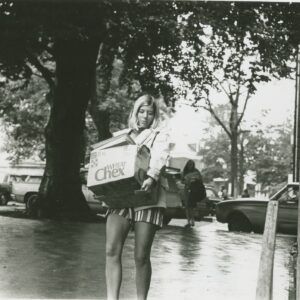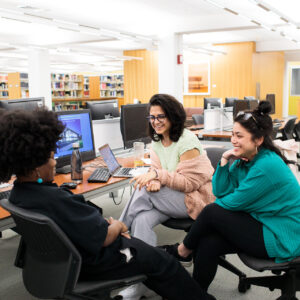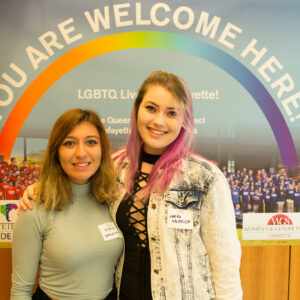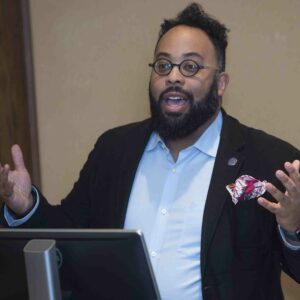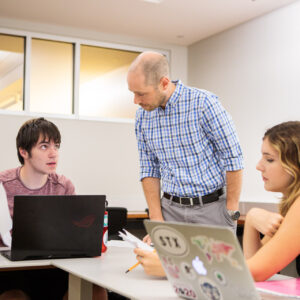The Libraries' Role in Promoting Diversity, Equity, and Inclusion
Library staff are committed to providing a welcoming environment for all students, faculty, and staff, and our core values reflect this commitment. We have a Diversity, Equity, and Inclusion Plan in which all library staff are invested, and the Library’s DEI Working Group meets monthly to monitor progress on the plan and discuss DEI issues as they arise.
On this page, we highlight some of the ways that we put these values into action. If you have ideas for more we could do in any of these areas, please get in touch with the staff member responsible for the service. If you see something not on this page that you think the libraries should be doing, please contact Ana Ramirez Luhrs, Co-Director of Special Collections and College Archives or Charlotte Nunes, Dean of Libraries.
Hosting events
Library staff organize many events that deal with topics relating to diversity, equity, and inclusion. These include community-wide discussion groups on social justice readings such as Chimamanda Ngozi Adichie’s “We Should All Be Feminists;” faculty or student-led brown bags such as those that provide international students an opportunity to discuss the cuisine of their home regions; the “What’s in a name” series, during which people talked about naming traditions, cultures, and pronunciations; and formal lectures by well known figures such as Kevin Young, poet, essayist, editor, and curator at the New York Public Library’s Schomburg Center.
For more on events, contact Charlotte Nunes, Dean of Libraries or Lijuan Xu, Director of Research & Instructional Services.
Curating exhibitions
Exhibits in Skillman are regularly built around topics relating to diversity, equity, and inclusion. Such exhibitions have focused on the founding of the Association of Black Collegians, prints honoring the life of Rosa Parks, Larry Fink’s photography of the 2017 Women’s March, and the Marquis de Lafayette’s historic commitment to the anti-slavery movement.
For more on exhibitions, contact Special Collections and College Archives.
Documenting the College’s history
In documenting the College’s history, staff in the College Archives strive to ensure that all voices are represented. Two projects specifically designed to fill gaps in the archives are the Oral History Project, which documents the education and life experiences of African-American and women students from the late 1960s and early 1970s, and the Queer Archives Project, which documents and preserves the experiences and reflections of Lafayette’s LGBTQ+ community.
For more on documenting the College’s history: Elaine Stomber, College Archivist.
Making textbooks more affordable
Through its Course Affordability Initiative, the Libraries provide guidance and grants to faculty who are interested in making the transition to low cost or no cost alternatives to textbooks.
For more on course affordability: Ben Jahre, Head of Electronic Resources.
Advising and mentoring students
Librarians provide formal and informal support to students, including those from underrepresented groups and international and first generation students, in their work as academic advisors, first-gen mentors, Posse mentors, and advisors to student groups. Lijuan Xu and Ana Ramirez Luhrs have written about these experiences in their article, “From coloring the academic landscape to integral players of the community: Underrepresented minority librarians flexing their service muscles” (Journal of Academic Librarianship, Nov 2020).
Supporting collaborative digital collections
Digital Scholarship Services supports community-engaged and student-led digital collecting efforts animated by the values of diversity, equity, and inclusion. Examples include the Queer Archives Project digital humanities site and the Lehigh Valley Engaged Humanities Consortium Digital Archive.
For more information: Angela Perkins, Director of Digital Scholarship Services.
Encouraging exploration of careers in libraries
The Careers in Library & Information Science (CLIS) program is a collaboration between Lafayette, Haverford, Swarthmore, Gettysburg and other local PA college libraries that brings together students from underrepresented groups for a week-long exploration of the Library and Information Science profession. During the program, students learn about the various career options within the LIS profession and the connections between librarianship and social justice.
For more on the CLIS program: Ana Ramirez Luhrs, Co-Director of Special Collections and College Archives.
Purchasing books and other materials
When selecting materials for purchase, librarians strive to build a diverse collection and intentionally seek out materials by or about traditionally marginalized and underrepresented groups. When purchasing electronic resources, we evaluate accessibility for users with disabilities and require licenses that provide protections for users’ privacy. The Library also financially contributes to numerous open access publishing projects to support universal and equitable access to the scholarly record.
For more on collections: Ben Jahre, Head of Collections Strategies.
Making primary sources and research materials available through digitization
Digital Scholarship Services and College Archives and Special Collections provide digitization services for reference requests of CA&SC materials, and for curated digital collections. This supports use of the materials at the researcher’s convenience, off campus access to CA&SC materials, alternate access to the materials for researchers with disabilities, and makes materials available to the broader scholarly community beyond Lafayette College. It additionally opens the materials to digital scholarship methods and queries, supporting even broader scholarship.
For digitization consultation, contact DSS through the DSS Preliminary Request Form.
Making it easier to find materials
When cataloging or describing books, DVDs, and other materials in our Library Catalog, we strive to use inclusive subjects and retrospectively convert old (and sometimes offensive) subjects to more inclusive terms. For example, the old subject heading illegal aliens has been replaced with undocumented immigrants.
For more on terms used for cataloging: Joel Pearce, Head of Technical Services.
Making faculty articles freely available
In April 2011, Lafayette faculty adopted a resolution whereby each faculty member grants to the college permission to make available their scholarly articles in the Lafayette Digital Repository. Materials in this repository, which is built, populated, and maintained by library staff, are available free of charge to anyone, anywhere with access to the Internet.
For more on the repository: Nora Zimmerman, Digital Archivist & Repository Librarian.
Making digital assets accessible
Digital Scholarship Services strives to implement Universal Design principles in the development and deployment of digital collections and projects. Our ongoing work in this area includes developing descriptive alt text for our extensive digital image collections, transcribing and captioning digital audio and visual collections, creating well structured website content and digital documents, and using platforms that can be flexibly accessed and navigated. We additionally provide assistance in digitally transforming materials into accessible formats for users with specific accessibility needs.
For more information, or to request assistance with accessible digital materials, contact DSS through the DSS Preliminary Request Form.
Using professional organizations and consortia to work for change
Library staff are active in many professional organizations and consortia and take advantage of the power of numbers in these groups to promote diversity, equity, and inclusion. During the period of national unrest in spring 2020, for example, the Oberlin Group of Libraries, of which Lafayette is a member, released a statement condemning systemic racism and violence and affirming a commitment to continuous anti-racist work across its libraries and institutions. Anne Houston, Dean of Libraries, serves on the Board of Directors of the Oberlin Group Libraries and helped draft the statement.
The Library also supports many groups designed to make scholarship and library software more openly accessible. Two such groups are SPARC and the Samvera Community open source repository software project.
